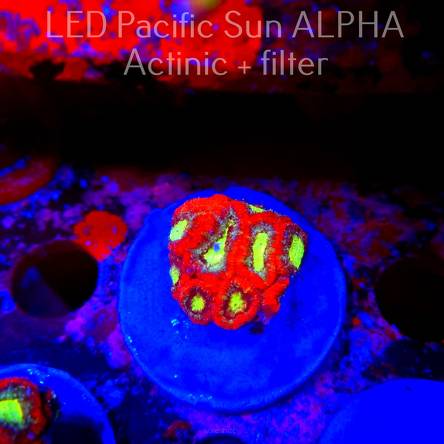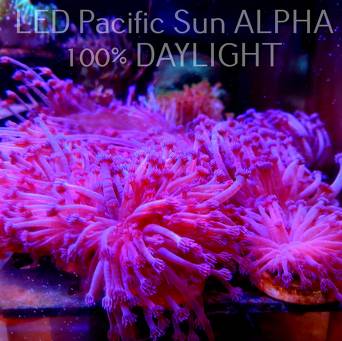FAVIA PREMIUM AUSTRALIA (02.11.2023) 3cm
- Manufacturer: JadwigaMorska
-
Availability:
 None
(0 pcs.)
None
(0 pcs.)
- pcs.
- €45.77
Favia and Favites are two types of hard corals from the Mussidae family that are popular among marine aquarium enthusiasts for their beautiful and colorful corals. Here is a description of these two types of corals and information on how to cultivate them in an aquarium:
Description of the Favia Genus:
-
Appearance:
-
Favia corals form colonies consisting of small, spherical polyps attached to a hard calcium carbonate skeleton.
-
These polyps have soft tissues and appear to be covered with small, visible layers of flesh.
-
Favia comes in various colors, including brown, green, purple, pink, and blue.
-
-
Size:
-
Individual Favia polyps are relatively small, typically measuring from a few to several centimeters in diameter.
-
Description of the Favites Genus:
-
Appearance:
-
Favites corals form colonies with many polyps that have elongated, spindle-shaped shapes.
-
Favites polyps are surrounded by a hard, layered calcium carbonate skeleton.
-
Favites comes in various colors, including brown, green, purple, pink, and blue.
-
-
Size:
-
Favites colonies can range from a few centimeters to several centimeters in width.
-
Cultivation of Favia and Favites Corals in the Aquarium:
-
Lighting:
-
Provide moderate to bright lighting in the aquarium. LEDs or T5 lamps with moderate intensity are often used for cultivating Favia and Favites.
-
-
Water Flow:
-
Both types of corals prefer moderate water flow. Ensure moderate water movement around the corals to provide nutrients and maintain cleanliness.
-
-
Salinity Level:
-
Maintain a stable salinity level in the aquarium, typically around 1.025.
-
-
Feeding:
-
Favia and Favites are photosynthetic corals, meaning they obtain some of their nutrients through photosynthesis. You can also feed them marine plankton or specialized coral foods available at pet stores.
-
-
Cleaning and Maintenance:
-
Regularly remove sediment and leftover food to maintain water cleanliness in the aquarium.
-
Monitor the health of Favia and Favites corals, responding to any changes such as polyp retraction or bleaching.
-
Cultivating Favia and Favites corals in the aquarium is a rewarding experience that allows you to enjoy the beauty of these corals in your home tank. It's important to maintain stable conditions and regularly care for the corals to preserve their health and colorful appearance.
Benefits of Buying Corals from Aquarium Cultivation:
Aquarium coral cultivation has become increasingly popular in the world of aquarium enthusiasts for several important reasons. Here are some advantages of purchasing corals from aquarium cultivation:
-
Protection of Natural Coral Reefs:
-
One of the primary benefits is that corals cultivated in aquariums are not harvested from wild coral reefs. This means that you are not contributing to the destruction of natural marine ecosystems.
-
-
Sustainable Aquaculture:
-
By buying corals from cultivation, you support sustainable aquaculture, which is more environmentally friendly than harvesting corals from wild reefs. This contributes to the preservation of marine biodiversity.
-
-
Greater Availability and Variety:
-
Aquarium cultivators often offer a wider range of coral species and varieties, allowing aquarium enthusiasts to create more diverse and interesting ecosystems in their tanks.
-
-
Healthier and Less Prone to Disease:
-
Corals from cultivation are typically healthier and less susceptible to diseases compared to those harvested from wild reefs. Aquarium cultivators often conduct regular testing and care for their corals, preventing diseases.
-
-
Proper Cultivation Conditions:
-
Coral cultivators control and maintain stable water conditions, ensuring optimal lighting, water flow, and nutrient levels. This promotes healthy growth and vibrant colors in corals.
-
-
Support for Enthusiasts:
-
Aquarium cultivators often offer support and advice, which can be particularly helpful for novice aquarists. You can gain valuable insights into coral care and cultivation from experienced cultivators.
-
-
Safe and Legal Alternative:
-
When you purchase corals from aquarium cultivation, you avoid potentially illegal trade in wild corals, which can lead to the degradation of natural coral reefs.
-
-
Supporting Scientific Innovation:
-
Aquarium cultivators often engage in research related to coral conservation and reef restoration. By buying from them, you also support these innovative scientific efforts.
-
Buying corals from aquarium cultivation is a sustainable and ethical way to own beautiful corals in your aquarium. It is also a means of engaging in the protection of marine nature and preserving wild coral reefs for future generations.








